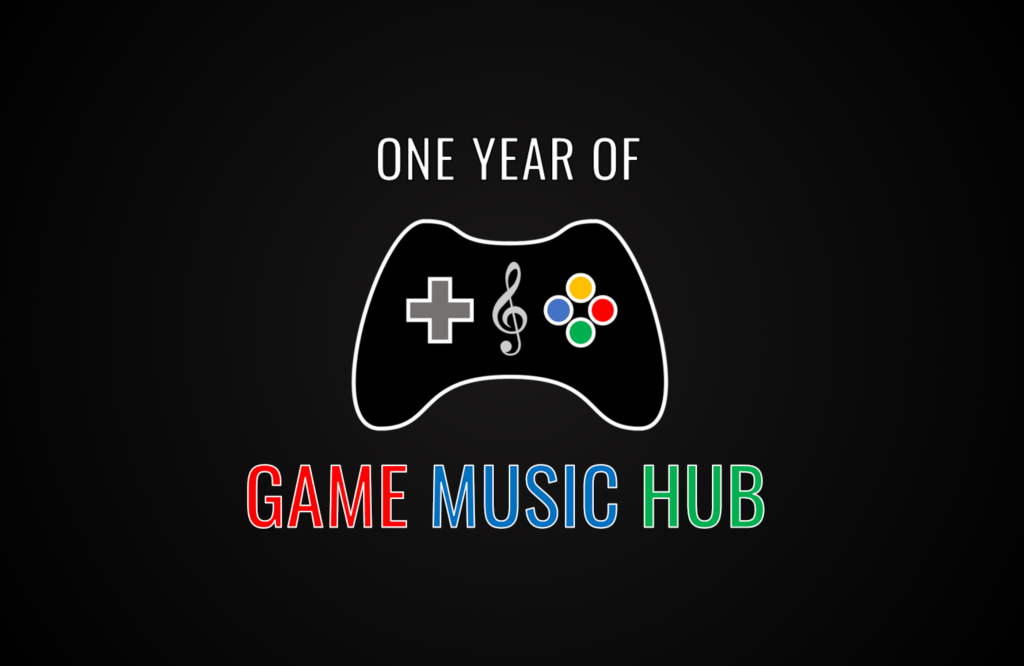Game Music Hub turns one year old!
And what a year it has been. I want to thank everyone who has read anything written here at any point during the last year. The fact that anyone was even mildly interested in my ramblings does not go unnoticed from this side of the screen.
Even though the site came together in a matter of months, the idea behind it has gestated in my brain for at least half a decade. If you can’t already tell, I adore talking about scores, and not just those written for games. For as long as I’ve been a fan, I’ve been fascinated by everything that film, TV and game music have to offer, from their storytelling to their emotional power.
With games there’s an added bonus owed to their interactivity, something that neither film nor TV can offer. The more I learn about interactive music systems, the more fascinated I become by them. You’re telling me that a score can react to MY actions? That you can have a score adapt to whatever is happening on-screen in real time?
But it always felt like, especially compared to film and TV scores, there was a general lack of coverage from journalists, at least in a way that I felt was truly doing justice to the work that composers are doing for games. In the case of film and TV, you’ve got an entire organization with the International Film Music Critics Association (IFMCA) populated by passionate people all around the world talking about film and TV music. No such thing exists for game music. And while there are quite a handful of prominent media outlets and YouTube channels dedicated to it (some of them from composers themselves!), I feel like there’s still a long way to go.
Game Music Hub was born out of my desire to see game scores covered the way I would love to read about them, the way I already read about film and TV music. To really get into the nitty-gritty of what makes them work, what makes them resonate. To break them down and analyze them narratively, emotionally and, most importantly, how each composer accounts for interactivity in their music.
I’d be lying if I said that the year has been smooth sailing. There have been quite a few bumps along the road, half of them owed to this entire thing being run by a single person already working a full-time job, and the other half to my overly-ambitious ideas.
Oftentimes, the two go hand in hand. I’ve mentioned in a previous article how the very nature of the analytical essays I do here requires them to take huge amounts of time to come together, and that’s something I don’t always have available. I actually skipped a month of publishing last year because I didn’t have enough time to finish what I was writing for that month and the articles for the subsequent months were going to require more attention than usual.
On the other hand, there have been a couple of articles I’ve had to temporarily shelve due to my relative lack of knowledge on certain subjects (which I’m now remedying by reading about them). If you’ve been reading for that long, you’ll probably remember an article I wrote last year about God of War‘s main antagonist and his musical arc throughout the game. Well, that was one of two I was planning for the game in 2021.
The second was a general overview of how the combat music system seemed to be put together, and was due to be published before the one that did come out. But I was in the middle of doing research when I realized that the stuff I was dealing with was complex and I just didn’t know enough about how a sound engine works to write confidently about it.
So I’ve since slowly made my way into learning more deeply about interactive music systems since then. Hopefully, once I feel ready to tackle it, I’ll come back to that article.
But even with the handful of setbacks that have come up throughout 2021, fifteen articles have been written since I started GMH, which is honestly not that bad a track record. My initial aim was for me to write an article a month, but that changed when Modding the Score entered the picture. As far as time commitments go, Modding the Score playlists are much lighter endeavors, so fitting one of them a month didn’t disrupt much of my schedule. This is why even when I couldn’t finish a proper article in any given month, there was still a playlist ready to go to tide things over until the next month.
And I am immensely proud of the things I’ve written so far. They all cover the general bases for what I want GMH to be in the long run. I’ve written about the narrative power of game music with God of War and The Banner Saga trilogy; I’ve talked about those special, magical moments that can only happen in games when I wrote about Ghost of Tsushima; I used Celeste and Ori and the Will of the Wisps to exemplify how the clever marriage between music and interactivity can greatly benefit one’s experience of a game.
They are all, by themselves, their own accomplishments. The fact that anyone found any of them interesting was just more proof to me that I should keep doing it. There is clearly an audience that cares about this (though huge YouTube channels like 8-Bit Music Theory and Scruffy are already plenty of indication, clearly not someone with a tiny fraction of their audience like me), and I love helping people look at game music they’ve previously enjoyed in a new light.
The kind messages I’ve received from composers have also been unexpected delights. Reading from people like Lena Raine and Austin Wintory (whose work I haven’t been shy in praising) were probably some of the highest points for GMH in this first year, and I will forever treasure their appreciation for my appreciation of their work.
As I look to the future, I want GMH to remain primarily as a game music site. However, it has always been my intention to slowly let a couple of off-topic articles creep in every now and again.
My promise to myself was that, if I somehow managed to make GMH last for an entire year, I’d allow myself a month for off-topic articles every year, where I’ll cover stuff about film and TV music. I’m still trying to scramble together a schedule for 2022, so I will let you all know later in the year whenever that finally happens.
As for my game music objectives, I will continue to write about scores that excite me, and more specifically than that, I’d like to delve a lot deeper into the interactivity of game scores. Expect a lot more articles like those for Ori and the Will of the Wisps and Celeste this year.
Thinking on a more long-term basis, there is only one natural evolution I see GMH taking right now, and that’s towards the realm of composer interviews. At the end of the day, there is only so much I can say with absolute certainty regarding a game’s music systems. I don’t have the insight of having worked on them, so that naturally only leads me to speculate on what they may or may not be doing to make them work in certain ways.
Getting insights from the brains who conjured them up themselves would lead to much deeper and richer articles and that’s to the benefit of all readers. So, having fulfilled my promise of keeping GMH alive for an entire year, I hereby make a second promise– that before the end of 2022, and provided there is a game that allows me the right opportunity, I will have interviewed a composer for an article.
Will I be able to keep this promise? Who knows. The world is a complicated mess of busy people and incompatible time zones. Will I still do my mighty best to make it happen? Hell yes (composers, I’m coming for you!).
Happy birthday, Game Music Hub. Here’s to many more of those.
–Andrés

